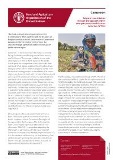SFERA – Special Fund for Emergency and Rehabilitation Activities
What is SFERA? The Special Fund for Emergency and Rehabilitation Activities (SFERA) was established in 2004 to enhance FAO’s capacity to rapidly respond to emergency situations. Through strategic resource partner funding, SFERA
provides FAO with the financial means and flexibility to react promptly to humanitarian crises, reducing the time between funding decision and action on the ground.
Why invest in SFERA? Most of the poor and hungry depend on renewable natural resources for their livelihoods. These natural resource-based livelihoods are most affected by natural hazards, transboundary animal and plant pests and diseases, socioeconomic shocks, conflict and protracted crises, making smallholder farmers, fishers and herders more vulnerable to shocks.
During a crisis, many productive assets such as seeds, livestock and fishing gear are lost. FAO’s first priority is to help affected farming families produce their own food, rebuild their lives and livelihoods as quickly as possible while strengthening their resilience.
When effective agriculture-based response is delayed, communities suffer a domino effect of further losses that plunge them deeper into poverty and reliance on external aid.
Benefits
- Rapid and effective agricultural assistance thanks to the quick release of funding within a few days after a disaster, even before official resource partner agreements are finalized.
- Strategic programme support to formulate resilience building response.
- Quick capacity recovery of crisis-affected populations through rapid agricultural input delivery to restore food production and stabilize livelihoods.
- Increased cost-effectiveness by reducing time and transaction costs for all stakeholders.
Working capital
The working capital component allows to advance funds when there is a donor’s commitment to fund a project and before funds are released. It reduces the reaction time to emergencies by enabling FAO to initiate activities and purchase the most critical assets before funding from resource partners is received. By enabling a rapid response, this component helps to mitigate the impact of threats and emergencies.
Revolving fund
The revolving fund component supports the efforts of FAO’s emergency country teams to identify the most critical needs of affected populations, strengthen response capacity, and develop and coordinate technically sound response programmes. For example, it provides the possibility to deploy staff and organize needs assessments. Through the Level 3 emergency preparedness and response window, FAO can prepare for and respond to the extraordinary challenges facing the agriculture sector during a Level 3 emergency.
Programme
The programme component facilitates faster and more programmatic assistance that can be tailored to evolving needs on the ground. SFERA’s pooled funding approach provides the flexibility to adjust activities and support them according to the geographical and thematic areas of greatest need.
The programme component has three windows:
- Large-scale Programme window supports big emergency programmes (e.g., highly pathogenic avian influenza, El Niño, desert locust, COVID-19 pandemic, etc.). Funds from resource partners are flexibly allocated according to evolving needs and priorities on the ground;
- Agricultural Inputs Response Capacity window channels pooled funds from resource partners towards the immediate procurement and delivery of time-critical inputs;
- Anticipatory Action window enables FAO to act early once an impending threat has been identified, before disaster losses are sustained or livelihoods are compromized.
How to contribute?
- Provide unearmarked direct contributions to SFERA’s revolving fund.
- Authorize the transfer of interests or unspent balances from closed projects to SFERA’s revolving fund.
- Allocate a grant to a programme for more strategic assistance to a specific crisis.
- Provide funding to SFERA’s Agricultural Inputs Response Capacity and Anticipatory Action window for specific agricultural input assistance.
Through SFERA annual reports, resource partners receive yearly information on the activities and results achieved, as well as project highlights and stories below.
FAO seeks to further expand its partnership with resource partners through SFERA as an effective means to respond rapidly to shocks, maximize the impact on beneficiaries and increase the cost-effectiveness of preparedness, anticipatory action
and emergency response, thereby reducing the need for costly external assistance in the longer term.
Publications

Publications
Cameroon: Belgium's contribution through the Special Fund for Emergency and Rehabilitation Activities (SFERA)
04/2024
Cameroon, as most countries in the Sahel, is currently facing shocks that are affecting people’s food security and livelihoods.

Publications
Chad: Belgium's contribution through the Special Fund for Emergency and Rehabilitation Activities (SFERA)
02/2024
In Chad, about 2.9 million people are projected to experience high levels of acute food insecurity (Cadre Harmonisé Phase 3 and above) during the 2024...

Publications
Palestine: Belgium's contribution through the Special Fund for Emergency and Rehabilitation Activities (SFERA)
12/2023
The escalation of hostilities in Israel and Palestine is drastically affecting all dimensions of food security.
